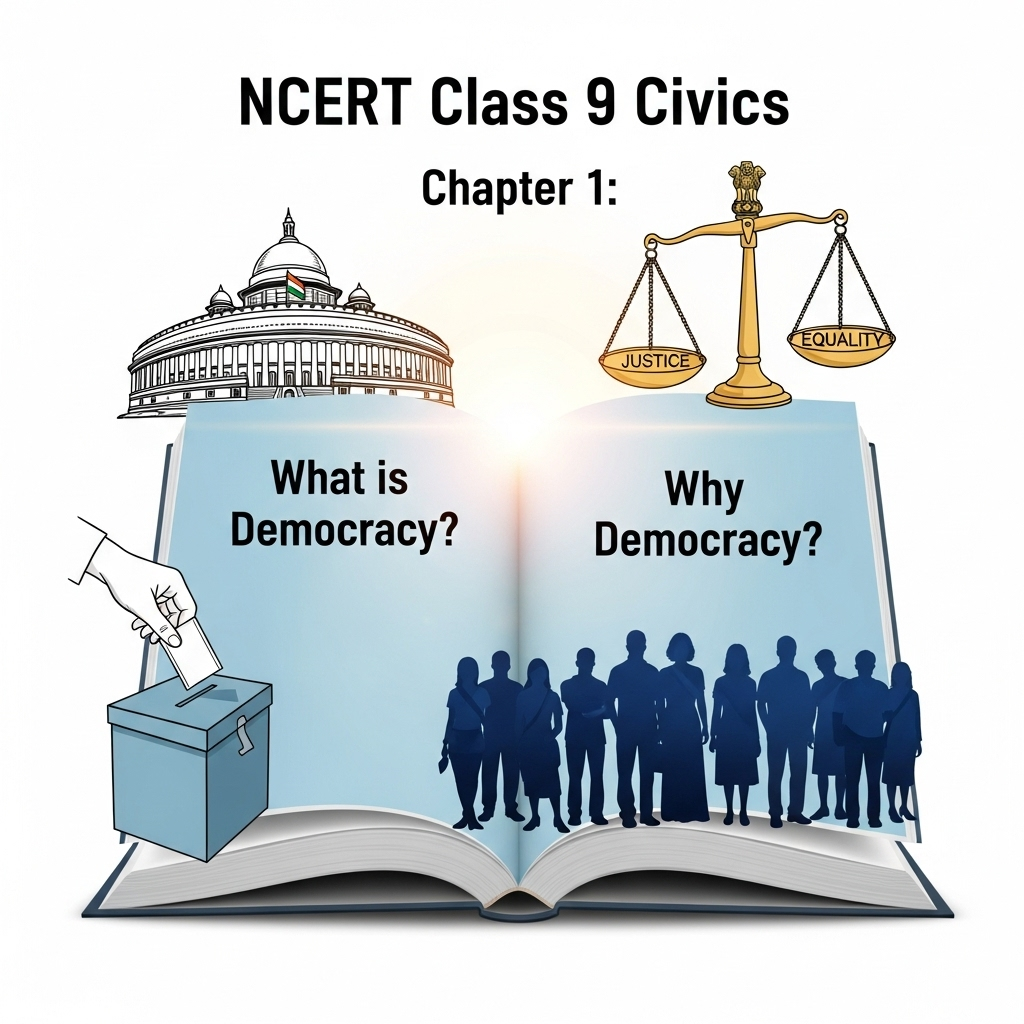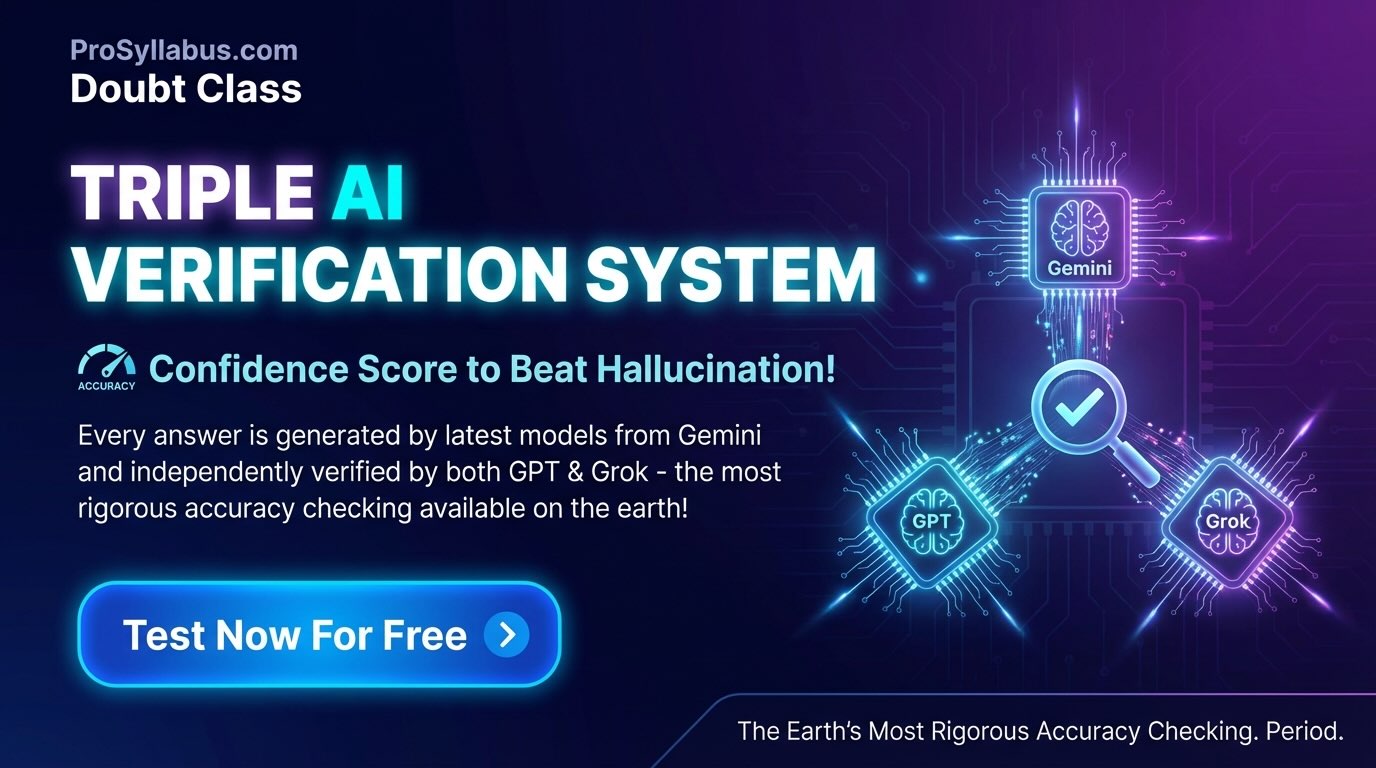Comprehensive Chapter Summary
Overview
The chapter begins by questioning the essence of democracy and its features. It builds on a simple definition, step-by-step unpacking the terms to clearly understand the bare minimum features of a democratic government. After distinguishing democratic from non-democratic forms, it introduces a broader idea of democracy beyond government structures.
- Democracy is the most prevalent and expanding form of government worldwide.
- Key questions: What makes it better than other forms? Why is it so popular?
- Through classroom dialogues (e.g., Lyngdoh Madam, Merry, Yolanda, Ribiang), it emphasizes thinking critically rather than accepting famous quotes blindly.
Learning Tip
Remember: Words like "democracy" evolve over time (e.g., from Greek 'Demokratia' meaning rule by people). Just as 'computer' shifted from calculator to multi-tool, democracy's meaning requires personal reflection for clarity.
1.1 What is Democracy?
The section debates the need for defining democracy through a classroom discussion, highlighting that definitions arise from usage and difficulties in distinction.
- Why Define?: We use words like 'pen', 'rain', 'love' without prior definitions, but need clarity to distinguish (e.g., rain vs. drizzle) or counter misuse (many governments falsely claim democracy).
- Greek Origin: 'Demos' (people) + 'Kratia' (rule) = Rule by the people. But origins aren't fixed; meanings change with time.
- Abraham Lincoln's Quote: "Democracy is government of the people, by the people, for the people" – beautiful, but unpack 'of', 'by', 'for'.
- Activity Insight: Defining simple words (pen vs. pencil) teaches no shortcuts; evolve definitions through thinking.
- List common features: Democratic (elected rulers) vs. Non-democratic (e.g., Myanmar army, Chile's Pinochet, Saudi kings born to rule).
Humorous Take from Text
"Democracy is of the people, far from the people, and where they buy the people." – Highlights cynical views; discuss if we accept such?
A Simple Definition and Its Limits
Starting point: Democracy is a form where rulers are elected by people. Useful to separate from clear non-democracies, but inadequate as it would label any election-holding regime democratic (misleading, as many pretend).
- Examples of Non-Democracies: Myanmar (army control), Pinochet (Chile dictator), Saudi Arabia (monarchy by birth).
- Need to Unpack: Who are rulers? What elections? Who votes? Limits on power?
- Quotes Activity: Analyze cynical quotes (e.g., "Democracy gives every man the right to be his own oppressor") for usefulness in understanding flaws and necessities.
Cartoon Analysis Tip
Iraq elections under US: 'Democracy' stylized skeptically – questions imposed vs. genuine rule.
1.2 Features of Democracy
Four key features unpacked with global examples for easy recall and application.
Major Decisions by Elected Leaders
Core: Final power must rest with elected, not unelected (army/external).
- Pakistan Example: Musharraf's 1999 coup overthrew elected govt; 2002 rigged referendum; 2002 Legal Framework Order let President dismiss assemblies, army-dominated Security Council supervised. Elections held, but real power with unelected military.
- Lesson: Happens in dictatorships/monarchies with fake parliaments; external powers too (e.g., some colonies).
- Easy Recall: Elected = Real Rulers; Unelected = No Final Say.
Syria Cartoon
Ba'ath Party only allowed; leaves crown = fragile democracy. Applies to China (one-party) or Mexico (PRI dominance)?
Free and Fair Electoral Competition
Elections must offer real choice and chance to remove rulers.
- China Example: 5-year elections for 3,000-member National People's Congress (appoints President); army elects some; candidates need Communist Party approval; only party/allies contest – no choice.
- Mexico Example: PRI won every 6-year election since 1930 (no military rule); used tricks: Forced govt employees to attend meetings, teachers pressured parents, media ignored/criticized opposition, last-minute booth shifts, huge campaign spending – unbeatable till 2000.
- Lesson: Not just any election; must be fair, with opposition win possible. More in Ch. 3.
- Easy Recall: Choice = Alternatives; Fair = No Dirty Tricks.
Latin America Cartoon
Moneybags 'building' democracy – corruption via funds. Applies to Pakistan? India (spending limits)?
One Person, One Vote, One Value
Political equality via universal adult franchise.
- Denials: Saudi women no vote till 2015; Estonia citizenship rules hinder Russian minority; Fiji system values indigenous Fijian vote more than Indian-Fijian.
- Lesson: Each adult one equal vote; denies equality. More in Ch. 3.
- Easy Recall: Equality = One Vote per Person, Same Weight.
Link to History
Struggle for democracy tied to universal franchise demands – now global norm, but exceptions persist.
Rule of Law and Respect for Rights
Government limited; respect rights before/after elections.
- Zimbabwe Example: Independence 1980; ZANU-PF/Mugabe won regularly but unfairly: Constitution changes increased presidential power, opposition harassed/disrupted, protests illegal, law limited criticism, govt-controlled TV/radio, independent papers pressured, ignored court judgments; ousted 2017.
- Pre-Election: Room for opposition, basic rights (think, opine, express, associate, protest); equal law; independent judiciary.
- Post-Election: Can't do anything; respect rules, minorities; consultations; constitutional rights/responsibilities; accountability to people/officials. More in Ch. 4 (accountability), Ch. 5 (rights).
- Lesson: Popular = Necessary, but not sufficient; can be autocratic without rights/fairness.
- Easy Recall: Limits = Constitution + Rights; No Unlimited Power.
Iraq Cartoons Comparison
First: Imposed under US. Post-Saddam: Him jailed, but 'one man one vote' – transition, but question genuineness.
China Cartoon
Blocked info (Google/Yahoo); tanks/student = Tiananmen reminder – restricted rights.
Summary Definition
Democracy: Form where elected rulers take major decisions; elections offer fair choice/opportunity to change equally; leads to govt limited by constitution/citizens' rights.
- Broader Idea Tease: Beyond govt – democratic classroom/family? (E.g., elected decisions, fair input, equality, rights.)
- Why Better?: Ensures people's rule; expands globally for justice/equality.
Questions from Chapter End
- Distinguish using features; apply to examples.
Questions and Answers from Chapter
20 Short Questions (1-2 Marks Each)
1. What is the Greek origin of democracy?
Answer: Demokratia: Demos (people) + Kratos (rule) = Rule by the people.
2. Why define democracy?
Answer: To distinguish from misuse; many governments falsely claim it.
3. Lincoln's definition of democracy?
Answer: Government of the people, by the people, for the people.
4. Simple definition of democracy?
Answer: Rulers elected by the people.
5. Example of non-democracy: Myanmar?
Answer: Army rulers not elected.
6. Musharraf's 1999 action in Pakistan?
Answer: Military coup overthrowing elected government.
7. Feature 1 of democracy?
Answer: Final decisions by elected rulers.
8. China's election issue?
Answer: Candidates approved by Communist Party; no choice.
9. Mexico's PRI rule till when?
Answer: 2000.
10. Feature 2 of democracy?
Answer: Free and fair elections with real choice.
11. Saudi voting for women till when?
Answer: 2015.
12. Feature 3 of democracy?
Answer: One person, one vote, one value.
13. Zimbabwe independence year?
Answer: 1980.
14. Mugabe ousted in?
Answer: 2017.
15. Feature 4 of democracy?
Answer: Rule within constitutional law and rights.
16. What is universal adult franchise?
Answer: Equal voting right for all adults.
17. Why Pakistan not democracy under Musharraf?
Answer: Army held final power, not elected reps.
18. PRI's dirty tricks in Mexico?
Answer: Forced attendance, media bias, booth shifts.
19. Fiji's voting inequality?
Answer: Indigenous Fijian vote > Indian-Fijian.
20. Zimbabwe's undemocratic practices?
Answer: Harassed opposition, controlled media, ignored courts.
20 Medium Questions (3-4 Marks Each)
1. Why think about democracy's meaning ourselves?
Answer: Words evolve; origins insufficient; need to distinguish true from fake democracies via features.
2. Simple definition's limitations?
Answer: Would call any election-holding government democratic; ignores fake ones; need unpack 'rulers', 'elected'.
3. Pakistan under Musharraf example.
Answer: Coup 1999, rigged referendum 2002, Legal Order gave army control; elected but no final power.
4. Feature 1 explanation.
Answer: Elected must hold final power; not unelected army/external; ensures people's rule.
5. China's elections undemocratic why?
Answer: Regular but party-approved candidates; no serious choice; always Communist government.
6. Mexico PRI's tricks.
Answer: Forced votes, media ignore opposition, booth shifts, huge spending; no defeat possible till 2000.
7. Feature 2 details.
Answer: Real alternatives; fair chance to lose; based on free/fair elections.
8. Examples of vote denial.
Answer: Saudi women till 2015; Estonia Russians hard citizenship; Fiji unequal value.
9. Feature 3 importance.
Answer: Fundamental equality; each adult one equal vote; universal franchise.
10. Zimbabwe Mugabe rule.
Answer: Won since 1980 but unfair: Constitution changes, opposition harassment, media control, court pressure; ousted 2017.
11. Feature 4 pre-election needs.
Answer: Room for opposition, basic rights: Think, express, associate, protest.
12. Feature 4 post-election.
Answer: Respect rules, minorities; consultations; accountability via constitution/law.
13. Summary definition points.
Answer: Elected take decisions; fair choice equal; limited by law/rights.
14. Why popular approval insufficient?
Answer: Can be undemocratic/autocratic; need rights, fair process.
15. Activity lesson on definitions.
Answer: Distinguish clearly; apply to democracy for bare minimum features.
16. Iraq cartoon message.
Answer: Imposed democracy under foreign powers; skeptical of genuineness.
17. Syria cartoon meaning.
Answer: Limited parties; fragile democracy (leaves crown).
18. Latin America moneybags cartoon.
Answer: Corruption/money influences elections.
19. Democratic classroom?
Answer: Apply features: Elected decisions, fair choice, equality, rights respect.
20. Broader democracy idea hint.
Answer: Beyond government; in daily life like classrooms/families.
20 Long Questions (6 Marks Each) with Answers
1. Explain why we need a definition of democracy.
Answer: We use words without definitions until confusion arises; democracy misused by many governments. Dialogue shows: Origins (Greek) helpful but evolve; think ourselves to distinguish true features like elected rulers vs. fake. Activity: Defining pen teaches clear distinction needed for bare minimum understanding. (Approx. 120 words)
2. Discuss the simple definition and its inadequacies.
Answer: Rulers elected by people separates from non-democracies (Myanmar army, Pinochet, Saudi kings). But misleading: Many hold elections but control power (e.g., pretend democracies). Need unpack: Who rulers? What election? Who votes? Limits? Leads to four features. (Approx. 100 words)
3. Describe major decisions feature with Pakistan example.
Answer: Final power with elected; Pakistan: Musharraf coup 1999, referendum 2002 rigged, Legal Order army-dominated; elected assemblies but no real decisions. Applies to dictatorships/monarchies with fake parliaments. (Approx. 80 words)
4. Explain free/fair elections with China/Mexico.
Answer: Real choice to change rulers; China: Party-approved, no alternative. Mexico PRI: Dirty tricks (force votes, bias), unbeatable till 2000. Feature: Fair opportunity for opposition to win. (Approx. 70 words)
5. Discuss one vote one value with examples.
Answer: Equality: Each adult equal vote; Saudi women denied till 2015, Estonia Russians hard, Fiji unequal. Linked to universal franchise; denies some violates democracy. (Approx. 60 words)
6. Explain rule of law feature with Zimbabwe.
Answer: Limits via constitution/rights; pre-election: Freedoms for opposition. Post: Consultations, accountability. Zimbabwe: Mugabe won but harassed, controlled media, ignored courts; popular but autocratic. (Approx. 70 words)
7. Summarize four features of democracy.
Answer: 1. Elected final decisions. 2. Fair choice elections. 3. Equal vote. 4. Constitutional limits/rights. Ensures people's rule beyond minimal. (Approx. 50 words)
8. Why popular leaders can be undemocratic?
Answer: Approval necessary but insufficient; need fair process, rights (Zimbabwe example). Assess before/after elections. (Approx. 40 words)
9. Activity on word definitions lesson.
Answer: Teaches no shortcuts; evolve meaning by use; apply to democracy for clear features. (Approx. 30 words)
10. Iraq cartoon analysis.
Answer: Foreign-imposed; 'democracy' questioned under US presence. (Approx. 20 words)
11. Syria cartoon application.
Answer: One party rule; fragile (leaves); to China/Mexico limited parties. (Approx. 20 words)
12. Latin moneybags cartoon.
Answer: Money corrupts democracy; applies Pakistan/India spending. (Approx. 20 words)
13. Post-Saddam Iraq cartoon.
Answer: Transition from dictatorship; contrasts first cartoon's imposition. (Approx. 20 words)
14. China info block cartoon.
Answer: Restricts freedoms; recalls Tiananmen. (Approx. 10 words)
15. Democratic classroom?
Answer: Elected class reps, fair decisions, equal say, rights respect. (Approx. 20 words)
16. Democratic family?
Answer: Consultations, equal voice, no autocracy. (Approx. 10 words)
17. Quotes usefulness.
Answer: Highlight flaws (oppression, dictators) but stress necessity (justice, cure ills). (Approx. 20 words)
18. Why democracy expanding?
Answer: Better than others; features ensure people's rule. (Approx. 10 words)
19. Minimal vs. broader democracy.
Answer: Minimal: Government features; broader: In society like families. (Approx. 20 words)
20. Distinguish democratic/non-democratic.
Answer: Democratic: Elected, fair, equal, limited. Non: Unelected, rigged, unequal, unlimited. (Approx. 20 words)




